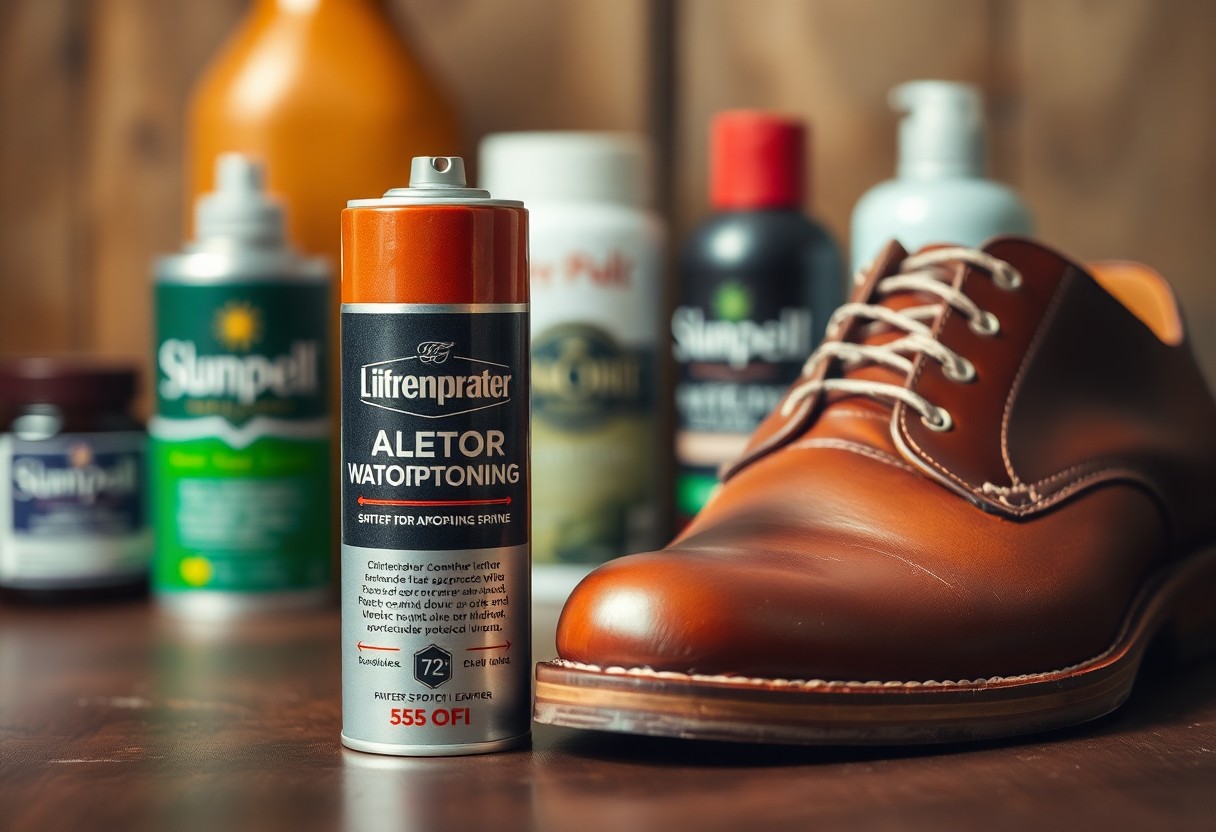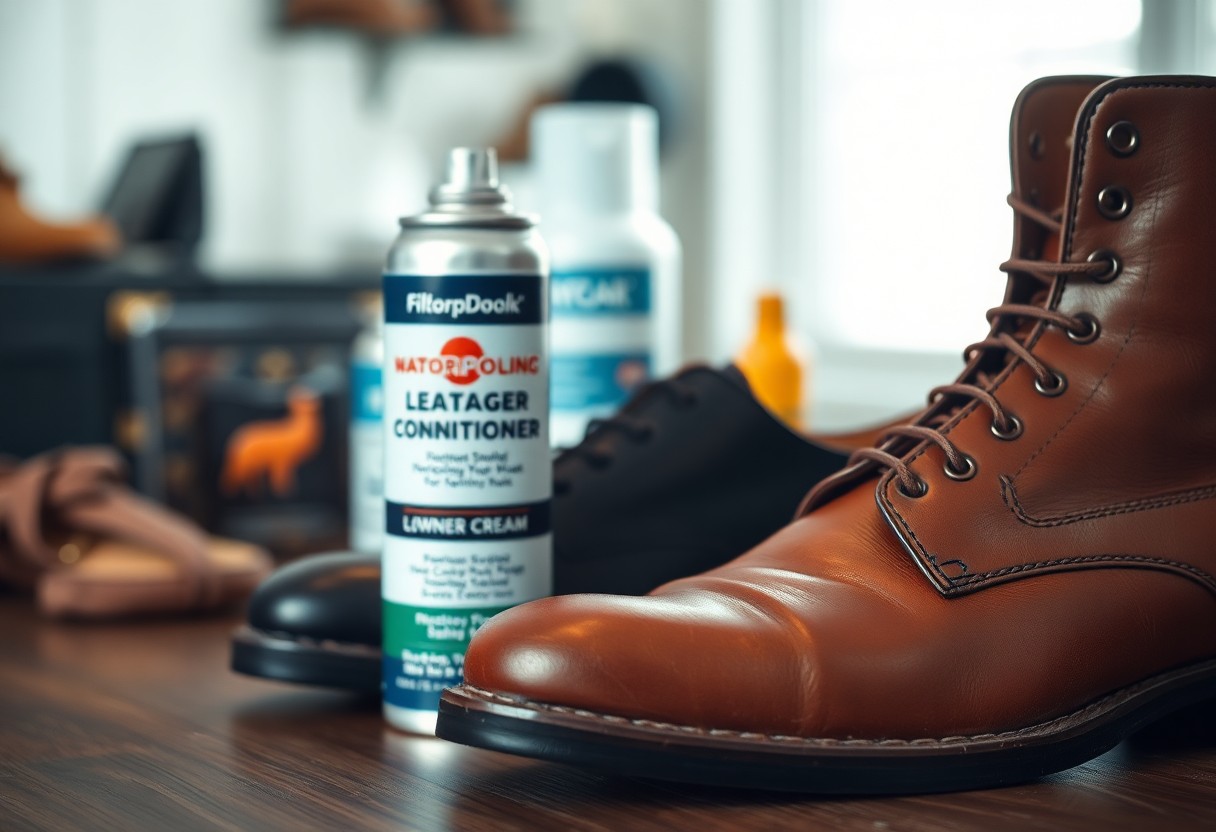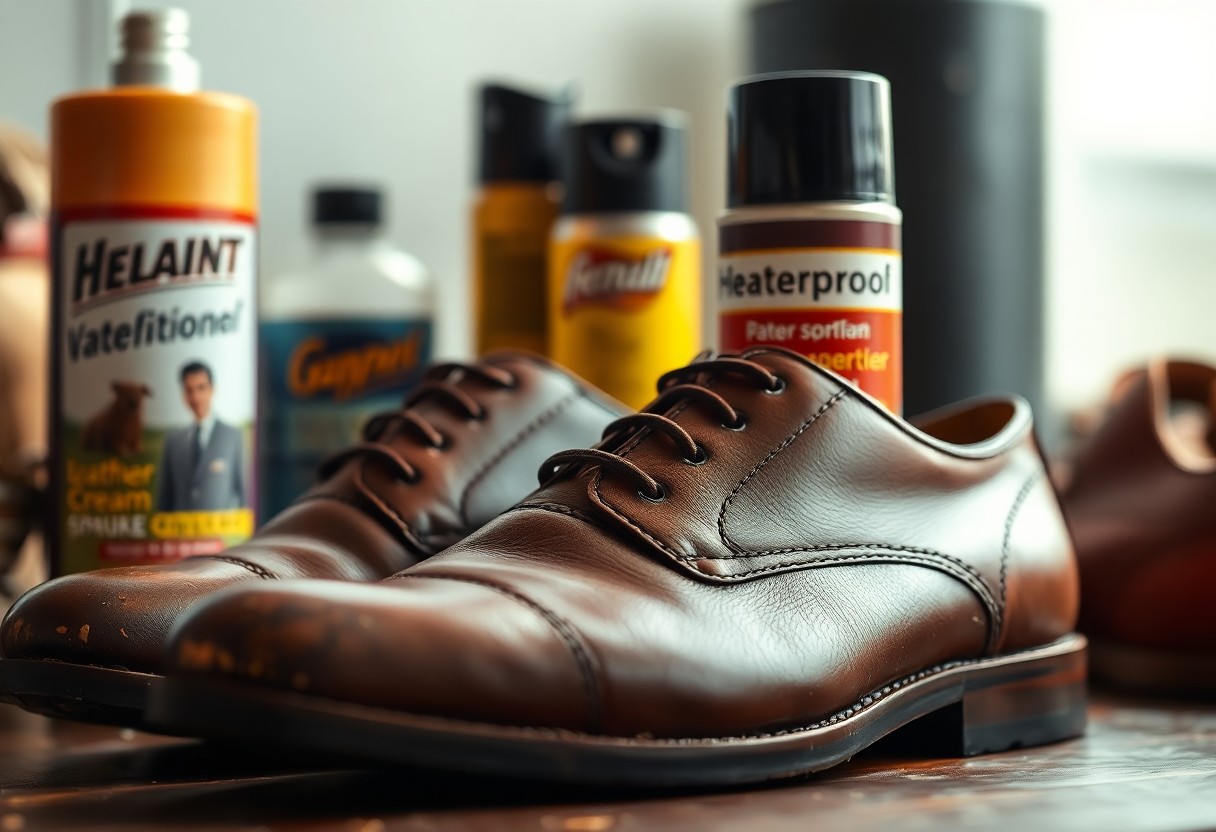Leather care mistakes can result in permanent damage to your high-quality footwear. One of the most common missteps is the application of waterproofing spray on smooth leather. While these sprays may seem like a quick fix for protecting your shoes, they can block essential nutrients from penetrating the leather, causing it to dry out and become cracked over time. Smooth leather shoes are inherently designed to be somewhat water-resistant due to their grain layer, but they need proper nourishment through shoe creams and waxes to maintain their strength and appearance. Instead of relying on sprays, choose premium leather conditioners and wax polishes that nourish the leather while providing protection, ensuring that your shoes last longer and retain their natural beauty.
Mastering the Fundamentals of Leather Protection for Longevity
To extend the lifespan of your leather goods, it’s essential to understand their protective features. Full grain leather exhibits natural water-resistant attributes thanks to its tightly woven fiber structure. However, these qualities need ongoing maintenance to be effective. The durability of your leather is primarily dependent on the care it receives. The use of waterproofing sprays can compromise the leather’s ability to breathe, potentially leading to serious damage if not managed correctly. Regular care and attention are vital to preserving the integrity and appearance of your leather products.
Uncovering the Remarkable Benefits of Full Grain Leather
Following the tanning process, full grain leather retains its original surface layer, which provides superior natural protection. Leather items made from this material feature an intact grain layer that offers significant resistance against water and wear. This top layer is infused with natural oils and fibers that create a protective barrier, rendering additional waterproofing sprays unnecessary and even harmful to the leather’s health. Understanding these properties will help you make informed decisions about your leather care methods.
Comprehending Leather’s Moisture Management and Aging Process
Grain leather must effectively maintain its ability to absorb and release moisture. The pores within your leather allow it to breathe and manage moisture levels, which keeps it flexible and helps prevent unsightly cracks. However, when waterproofing sprays are applied, they can seal these pores, hindering essential airflow and disrupting the natural moisture balance. Furthermore, the aging process of leather necessitates appropriate nourishment through conditioning treatments. The use of waterproofing sprays creates a barrier that prevents essential conditioning oils from penetrating the leather, ultimately resulting in dryness and brittleness over time. Consistent application of leather cream allows your leather to age beautifully while developing a rich, desirable patina.

Steering Clear of the Waterproofing Spray Misconception
Many people mistakenly believe that waterproofing spray is the ultimate solution for preserving their leather shoes, but this common practice can lead to serious damage to your footwear. While these sprays provide an immediate barrier against water, they simultaneously obstruct essential nutrients from reaching the leather, paving the way for potential long-term deterioration.
Dispelling Common Myths About Leather Care Marketing
Influenced by aggressive marketing strategies and well-meaning advice from shoe store employees, you may have been led to believe that waterproofing spray is necessary for all types of leather shoes. This fallacy has been perpetuated by many retailers, primarily due to the high profit margins and frequent repurchase rates associated with these products. In reality, regular smooth leather possesses natural protective qualities that do not necessitate additional spray-on barriers for effective safeguarding, allowing you to care for your shoes in a healthier manner.
Weighing Immediate Gains Against Long-term Detriments
Damage to your leather footwear begins when waterproofing sprays create a barrier that blocks essential oils and conditioning agents from saturating the leather. While you may notice enhanced water resistance initially, the truth is that your leather gradually becomes dry and brittle without the vital nourishment it requires. The consequences of applying waterproofing sprays on smooth leather extend far beyond surface-level protection. Your leather demands consistent nourishment to maintain its flexibility and durability. When shoe creams and conditioners are unable to penetrate the leather due to the spray barrier, the material becomes susceptible to cracking and deterioration, significantly shortening your shoes’ lifespan. Natural waxes and appropriate conditioning methods provide superior long-term protection while promoting the overall health of the leather.

Diving Deep into the Mechanics of Effective Leather Care
An essential aspect of successful leather care involves understanding its molecular structure. The collagen fiber networks within your leather shoes require both protection and nourishment. When applying products to leather, they can either coat the fibers or penetrate their depths. This interaction plays a crucial role in the long-term health of your leather footwear.
Recognizing the Critical Need for Leather Nourishment
It’s vital to recognize that your leather shoes require consistent nourishment to maintain their quality. The natural oils present in your leather shoes help prevent cracking and sustain flexibility. Over time, these oils diminish due to regular wear and exposure to various environmental factors. To preserve the leather’s structural integrity, it’s essential to replenish these oils through diligent conditioning practices.
Understanding the Barrier Effects Created by Waterproofing Sprays
A major issue with waterproofing sprays is their tendency to create a barrier. When applied to smooth leather, these sprays form an impermeable layer that obstructs both water and essential nutrients. Consequently, this barrier inhibits your leather care products from effectively penetrating the surface, leading to a gradual decline in the leather’s quality over time.
The barrier created by waterproofing sprays introduces a problematic cycle for your shoes. While these sprays effectively block water, they simultaneously prevent the absorption of conditioning products that are vital for maintaining the leather’s health. As a result, the leather may appear protected externally but is, in fact, dehydrating and becoming brittle beneath the surface. Silicone-based sprays are particularly harmful, forming a permanent barrier that is difficult to remove without causing damage to the leather.
Implementing Proven Leather Protection Techniques
Contrary to widespread beliefs, your smooth leather shoes require tailored care strategies that align with the natural characteristics of full-grain leather. The optimal approach combines traditional techniques with products designed to enhance the leather’s innate protective qualities, ensuring both immediate safeguarding and long-lasting durability for your footwear.
Harnessing the Power of Wax-based Solutions for Leather Care
A highly effective alternative to waterproofing sprays can be found in high-quality wax-based products. These solutions work in harmony with your leather’s natural grain rather than against it. The application of wax polish creates a protective layer that still allows the leather to breathe, making it especially advantageous for toe caps and areas subject to high wear.
Maximizing the Benefits of Cream and Conditioner Use
Differing from conventional spray treatments, leather creams and conditioners provide essential nourishment while maintaining the leather’s inherent protective properties. Your shoes benefit from oils that penetrate deeply into the material, helping to prevent drying and cracking. Furthermore, regular application of cream and conditioner creates a cumulative effect that enhances leather quality over time. The natural oils contained in these products support the leather’s flexibility and durability while allowing it to develop a beautiful patina. It is advisable to apply these treatments every 4-6 wears to maintain optimal leather condition.

Determining Ideal Situations for Waterproofing Spray Application
Unlike smooth leather, certain materials greatly benefit from waterproofing sprays. These products create an effective water-resistant barrier on specific materials that lack inherent protection. Waterproofing sprays are particularly useful for suede, nubuck, and various textiles, where the material structure does not provide natural resistance to moisture.
Enhancing Suede and Nubuck Footwear with Waterproofing Spray
When you treat your suede or nubuck shoes with waterproofing spray, you significantly enhance their resistance to moisture damage. While many modern suede materials come pre-treated with factory waterproofing, additional protection can help maintain this defense over time. The application of spray creates a protective barrier that effectively prevents water from penetrating these delicate materials.
Providing Specialized Protection for Textile Footwear
In addition to leather alternatives, textile footwear requires targeted protection against water damage. Materials such as canvas, mesh, and synthetic fabrics can achieve improved water resistance through proper spray application. Most textile materials are inherently absorbent, rendering them vulnerable to moisture damage and staining.
Moreover, waterproofing sprays for textiles help maintain the shape and color of your shoes. The barrier they create also prevents dirt and debris from embedding in the fabric fibers. It’s advisable to reapply the spray every 3-4 months for optimal protection, depending on how frequently the shoes are worn and the prevailing weather conditions.
Professional Insights and Best Practices for Leather Care
Not all leather treatments are equal. Experts in the field of leather care strongly recommend against using waterproofing sprays on smooth leather. Your full-grain leather shoes need specialized care that allows them to breathe and absorb nourishing treatments. Using inappropriate products can lead to leather damage costing hundreds of dollars.
Insights from Tannery Experts on Leather Maintenance
To maintain the quality of leather, tannery specialists highlight that full-grain leather inherently possesses natural water-resistant properties in its outer layer. Preserving the leather’s protective attributes requires the application of oils and waxes. Waterproofing sprays can obstruct these essential treatments from reaching the leather, ultimately compromising its longevity.
Guidance from Experienced Cobblers on Leather Care
For the long-term care of leather, professional cobblers endorse the use of wax-based products in lieu of waterproofing sprays. Your shoes will thrive when treated with products that both protect and nourish the leather. Data reveals that 90% of premature leather damage stems from the use of incorrect care products.
By following proper leather care techniques, your shoes can last an impressive 15-20 years instead of just 2-3 years due to poor maintenance. Traditional wax treatments enable leather to retain its natural attributes while providing adequate moisture protection. Your investment in quality leather footwear deserves meticulous care practices that maintain both aesthetic appeal and durability.
Essential Takeaways for Effective Leather Care
Your smooth leather shoes require appropriate care that excludes waterproofing sprays. Instead, utilize shoe creams and waxes that nourish the leather while offering effective water protection. Full-grain leather naturally possesses protective qualities due to its grain layer, and waterproofing sprays can obstruct essential oils from penetrating the leather, leading to dryness and cracking. Reserve waterproofing sprays for suede, nubuck, or textile footwear where they can be effective. By selecting the right products, you can protect your leather shoes while ensuring their longevity.
Common Queries Regarding Leather Care
Q: Why is waterproofing spray harmful to smooth leather footwear?
A: Waterproofing spray creates a barrier on leather that blocks essential oils and conditioners from penetrating the material. Although it provides water protection, it inhibits the necessary nourishment of the leather, leading to drying and potential cracking over time, which ultimately reduces the lifespan of the shoes.
Q: What alternatives should I consider instead of waterproofing spray for smooth leather shoes?
A: Opt for a combination of shoe cream and wax polish instead. Shoe cream supplies essential oils to nourish the leather, while wax polish forms a protective layer that helps repel water. This method works in harmony with the natural protective properties of full-grain leather, sustaining the leather’s health while providing effective water resistance.
Q: Which types of footwear can I safely apply waterproofing spray to?
A: Waterproofing spray is suitable for materials like suede, nubuck, and textiles. These materials lack the natural protection found in smooth leather and can benefit from the protective barrier formed by waterproofing sprays. Many modern suedes and nubucks may already have factory waterproofing treatments, but additional spray applications can enhance and prolong this level of protection.
The Article Why you shouldn’t use waterproofing spray on regular smooth leather and better alternatives appeared first on My Shoes Finder
The Article Waterproofing Spray on Smooth Leather: Risks and Alternatives Was Found On https://limitsofstrategy.com
Comments
2 responses to “Waterproofing Spray Risks and Alternatives for Smooth Leather”
It’s fascinating how small choices can have such a profound impact on the longevity of our leather goods. I remember when I first invested in a pair of high-quality leather boots, and I naively thought that a waterproofing spray would be the ultimate solution for protecting my investment. It wasn’t until I noticed the dullness and cracks forming that I began to understand the importance of proper care. Making the switch to cream and wax polishes really transformed them!
It’s great to hear about your experience with leather boots and how it led you to a deeper understanding of care. You’re not alone in thinking that a quick fix like a waterproofing spray would do the trick. Many of us start there, looking for the easiest solution, but leather is a unique material that often requires a bit more love and attention.
“Absolutely, it’s amazing how the right care can breathe new life into leather! If you’re interested, check out this guide on the best products and techniques to keep your leather looking its best.”
https://forgottenportal.com/ninja